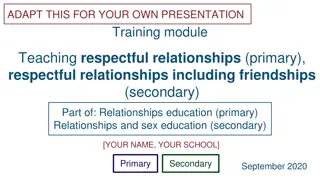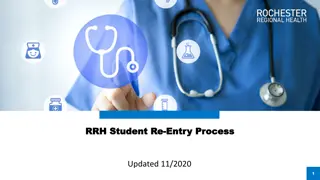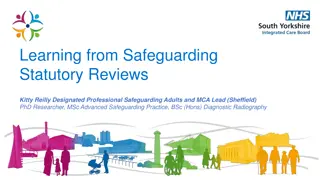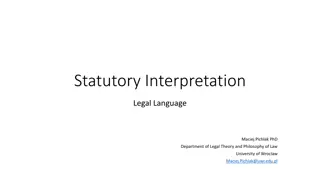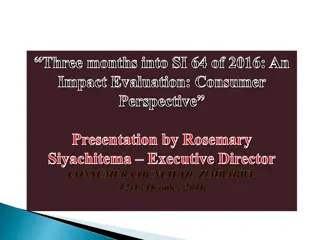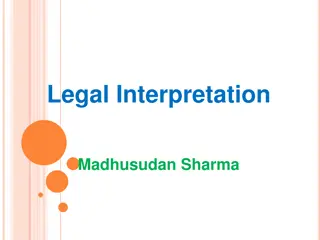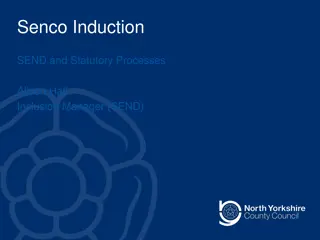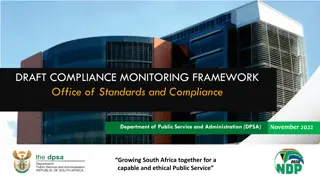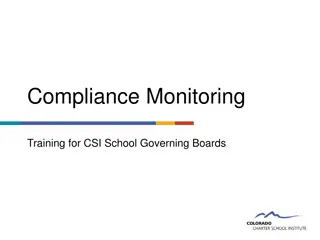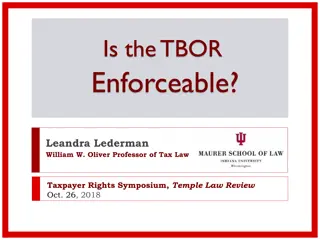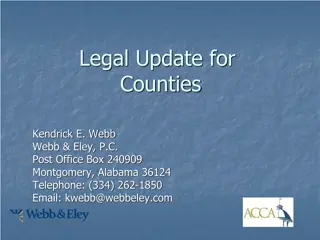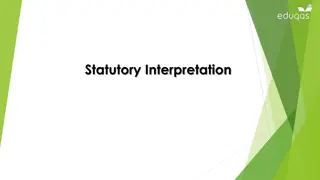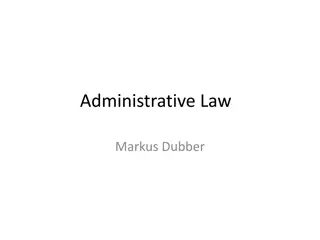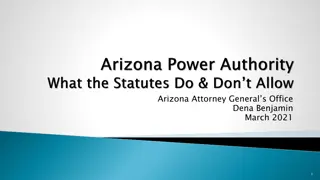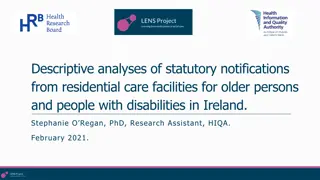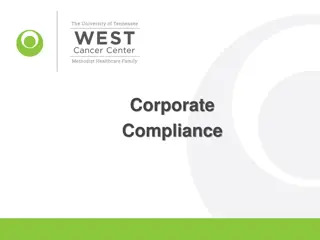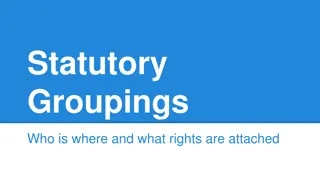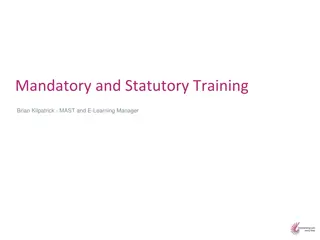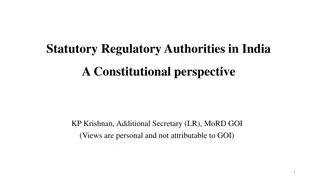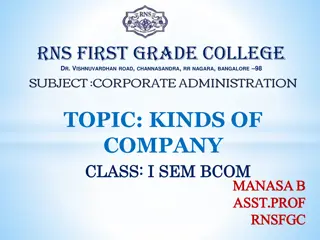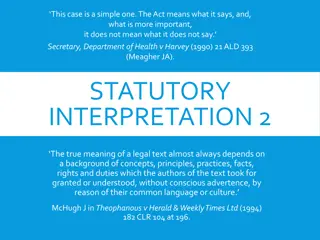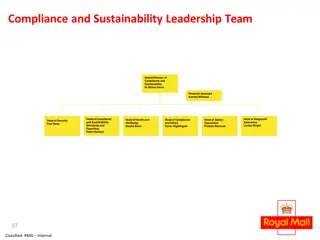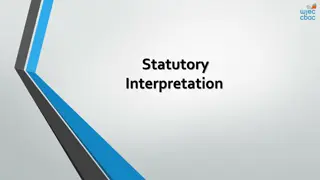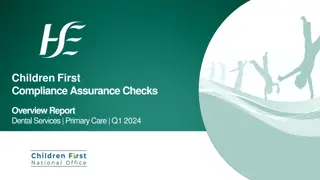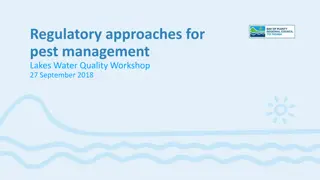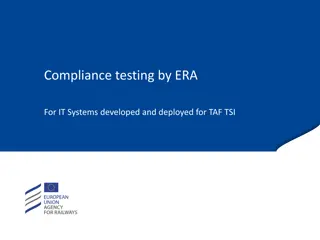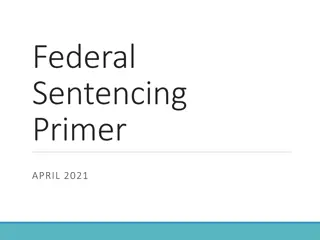Understanding the Duty to Report Child Abuse and Neglect
The duty to report concerns of child abuse, neglect, and harm is essential for practitioners and individuals coming into contact with children. This responsibility, whether statutory or non-statutory, requires prompt action to safeguard children at risk. Recognizing and acting on suspicions of abuse
0 views • 20 slides
Teaching Respectful Relationships: Primary and Secondary Curriculum Training Module
This training module focuses on teaching respectful relationships, including friendships, for primary and secondary school students. It covers key knowledge, strategies for handling class discussions, and ways to link topics across the curriculum. Schools can adapt this non-statutory guidance to com
2 views • 90 slides
RRH Student Re-Entry Process for Clinical Requests & Compliance
The RRH Student Re-Entry Process outlines steps for clinical request processing, approval, and compliance requirements for various disciplines within the nursing program and other departments. It includes sending requests to the Nursing Institute, communication procedures, compliance documentation,
0 views • 10 slides
Differences Between Statutory Crown Entity Boards and Commercial or NGO Boards
Statutory Crown entity boards differ from commercial or NGO boards in terms of ministerial influence, funding limitations, public scrutiny, and government standards. The responsible Minister has more interaction, and boards have limited discretion in funding and pricing adjustments. Crown entities f
1 views • 19 slides
Understanding Safeguarding Statutory Reviews and Best Practices
Exploring the importance of learning from safeguarding statutory reviews in various domains such as child practice, safeguarding adults, and domestic homicide reviews. The content discusses the statutory requirements for review processes and the responsibilities of relevant agencies in cases of abus
0 views • 7 slides
Core Area of Statutory Bank Branch Audit and Review of Advances by Hitesh Pomal
Explore the core areas of statutory bank branch audit, advances, NPAs, types of advances, review of advances, and considerations during the review. Learn about sanctioned terms, parameters, consortium advances, and frequent MOCs reported by auditors. Understand IRAC norms regarding income recognitio
0 views • 28 slides
Understanding the National Approach to Statutory Advocacy for Children and Young People
Exploring the significance of the National Approach to Statutory Advocacy for Children and Young People, this content delves into the role of advocates, the UN Convention on the Rights of the Child, and the fundamental principles guiding statutory advocacy. Learn about different types of advocacy, u
2 views • 44 slides
Understanding Different Types of Companies in Business
Explore the various kinds of companies in the business world, including statutory companies, registered companies, private companies, public companies, and more. Learn about the differences between private and public companies, statutory company examples like LIC and RBI, and the characteristics of
0 views • 25 slides
Understanding Statutory Interpretation in Legal Context
Explore the intricacies of statutory interpretation, linguistic and non-linguistic methods, and types of interpretation in legal contexts. Uncover the significance of legal reasoning, historical perspectives, and comparisons between Anglo-Saxon and Continental legal cultures. Delve into the complexi
1 views • 17 slides
Impact Evaluation of Statutory Instrument 64 of 2016 on Consumer Prices in Zimbabwe
Statutory Instrument 64 of 2016 in Zimbabwe regulates the importation of various products to promote local production. The legislation does not ban imports but requires licensing for bulk importers. The consumer prices of certain goods increased post-implementation, influenced by factors beyond SI 6
0 views • 14 slides
Legal Interpretation and Statutory Construction Guidelines
Legal interpretation and statutory construction present challenges when new laws are enacted. Courts must interpret statutes based on their popular sense, literal construction, and mischief rule to achieve the intended purpose. Sometimes, even clear language can pose difficulties in legal cases.
0 views • 9 slides
Statutory Assessment and Processes in Special Education
Understanding the statutory assessment process for children and young people with special educational needs and disabilities (SEND), including who can make requests, the steps involved, and the importance of EHCPs. Learn about the roles of casework managers and officers in assessing needs, providing
1 views • 15 slides
Enhancing Compliance Monitoring in South African Public Service
The Compliance Monitoring Framework developed by the Office of Standards and Compliance aims to improve adherence to public administration norms and standards in South Africa. This framework is designed to reduce non-compliance through ongoing supervision, investigation, and promotion of proper beha
3 views • 19 slides
Effective Corporate Compliance Program Overview
Corporate compliance is essential to prevent fraud, waste, and abuse within organizations. This program aims to detect and prevent deceptive practices, unnecessary costs, and improper behaviors. Key elements include appointing a Compliance Officer, establishing policies and procedures, providing edu
1 views • 19 slides
Overview of EHCP Processes and Statutory Assessment Team
This content provides detailed information on EHCP processes, including the role of the Statutory Assessment Team, the number of EHCPs maintained over the years, and the responsibilities of Casework Officers in the assessment and review process. It covers the statutory assessment process, the involv
0 views • 42 slides
Mastering Academic and Research Report Writing
Academic and research report writing is a crucial skill for modern educators. This course covers principles, techniques, and tools for effective dissemination of findings. Learn about the meaning of reports, classification, steps for writing, layout, and mechanics of research reports. Understand the
0 views • 45 slides
Post Award Fiscal Compliance: Who We Are and What We Do
Post Award Fiscal Compliance (PAFC) assists campus and central administrative units in mitigating non-compliance risks with sponsor terms and conditions by monitoring compliance, interpreting award requirements, providing training, and enhancing internal controls. The team includes Matt Gardner, Ass
0 views • 11 slides
Compliance Monitoring Training for CSI School Governing Boards
This training focuses on equipping governing board members with a general understanding of compliance monitoring activities, steps taken in instances of noncompliance, and statutory obligations outlined in C.R.S. 22-30.5. Through assigning responsibilities, ongoing monitoring, and audits, the traini
0 views • 23 slides
Understanding the Enforceability of Taxpayer Bill of Rights (TBOR)
Explore the enforceability of the Taxpayer Bill of Rights (TBOR) as outlined in IRC 7803(a)(3), delving into its history, statutory interpretation, the question of remedy, and enforcement issues. Discover the evolution of TBOR, statutory text, and challenges surrounding its enforcement.
0 views • 21 slides
Understanding Intergovernmental Relations in Kenya
Intergovernmental Relations (IGR) in Kenya involve interactions between government entities within a decentralized system. This presentation outlines the institutional framework, disputes, progress of audits, and assets/liabilities in IGR. It emphasizes the importance of statutory and non-statutory
2 views • 44 slides
Legal Update on Statutory Cap for Cities and Counties in Alabama
Alabama's statutory cap on damages against cities and counties has been a topic of contention since its enactment in 1977. Attempts to circumvent this cap by suing city or county employees individually have led to legal debates and court decisions, such as the cases of Morrow v. Caldwell and Alabama
1 views • 36 slides
Understanding Statutory Interpretation: Rules, Approaches, and Challenges
Explore the concept of statutory interpretation, including the intention of Parliament, problems that can arise, various rules and approaches used in interpretation, aids and presumptions, criticisms, and the relationship between statutory interpretation, EU law, and precedent. The Literal Rule, a c
2 views • 26 slides
Trust Modifications: Best Practices and Pitfalls
Common law allows for modification of irrevocable trusts with consent from settlor and beneficiaries, but changes must align with trust purpose. Recent trends show more flexibility in trust modifications, with new statutory remedies and tools like decanting and nonjudicial settlement agreements. How
0 views • 19 slides
Understanding Three Approaches to Statutory Interpretation in Administrative Law
Explore the concepts of Ordinary Meaning, Context, and Three Approaches to Statutory Interpretation in Administrative Law through insightful discussions and relevant examples. Gain a deeper understanding of legal interpretation principles and their application in legal frameworks.
1 views • 14 slides
Overview of Arizona Attorney General's Office Statutory Authority
The Arizona Attorney General's Office, represented by Dena Benjamin in March 2021, holds broad statutory authority subject to specific regulations and oversight. The office must adhere to various laws and regulations, file annual budgets, conduct audits, and comply with legal requirements in its ope
0 views • 26 slides
Descriptive Analysis of Statutory Notifications from Residential Care Facilities in Ireland
This study conducted by Stephanie O'Regan, a Research Assistant at HIQA, presents a descriptive analysis of statutory notifications from residential care facilities for older persons and people with disabilities in Ireland. The research explores the types of adverse events reported, trends in notifi
0 views • 30 slides
Importance of Compliance Training in Ensuring Ethical Business Practices
Compliance training at West Cancer Center plays a vital role in educating employees on laws, regulations, and company policies to ensure ethical conduct. With a commitment to compliance, the center's Code of Ethics emphasizes activities that adhere to laws and regulations, prioritize quality care, a
0 views • 31 slides
Understanding Statutory Groupings in Teacher Evaluation Systems
Explore the statutory groupings in teacher evaluation systems, including the relationship between TAP and ISBE ratings, factors determining grouping in Group I to Group IV, and the specific rights attached to each group based on summative ratings. Learn who falls into Group 1 and Group 2 based on pe
0 views • 20 slides
Mandatory and Statutory Training Overview
Mandatory and Statutory Training (MAST) is essential for all staff to ensure compliance and competence in areas like Fire Safety, Health, Infection Prevention, and more. This training is guided by Brian Kilpatrick, the MAST and E-Learning Manager, and covers accessing the MAST system, checking compl
0 views • 10 slides
Understanding Statutory Regulatory Authorities in India: A Constitutional Perspective
This presentation explores the rationale, rise, and structure of Statutory Regulatory Authorities (SRAs) in India within a constitutional framework. It discusses the importance of specialization, independence from political pressures, and global developments in regulatory agencies. The content delve
0 views • 31 slides
Types of Companies in Corporate Administration
This article discusses the various kinds of companies in corporate administration, including incorporated, chartered, statutory, and registered companies. It covers the definition of a company, different types of legal entities, and examples of each type. The classification of companies based on inc
0 views • 17 slides
Child Support Enforcement Final Rule Updates and Compliance Changes
This content covers technical corrections, regulatory provisions, compliance dates, and annual fee changes related to the Child Support Enforcement Final Rule. Updates include amendments based on statutory requirements and the Bipartisan Budget Act of 2018, impacting regulatory provisions and compli
0 views • 30 slides
Principles of Statutory Interpretation in Legal Context
Understanding statutory interpretation involves analyzing legal texts in light of background concepts, principles, and legislative intent. This process requires considering various factors to determine the true meaning of a statute. Different cases and statutes are referenced to illustrate the compl
0 views • 15 slides
Compliance and Sustainability Leadership Team Overview
This document provides an overview of the Compliance and Sustainability Leadership Team structure, including key positions such as Global Director, Head of Compliance and Sustainability Standards, and various advisors and managers responsible for safety, health, compliance, ethics, and risk manageme
0 views • 6 slides
Approaches to Statutory Interpretation: The Literal Rule
The Literal Rule in statutory interpretation mandates that all words in a statute be given their ordinary and natural meanings, even if the result seems absurd. This approach emphasizes following the clear wording of the law as enacted by Parliament. Advantages include respecting parliamentary sover
0 views • 26 slides
Compliance Assurance Report on Dental Services in Q1 2024
A compliance assurance report was conducted on dental services in Q1 2024 as part of the HSE Children First Compliance Assurance Checks. The report highlighted areas of compliance and partial compliance, with efforts noted to meet Children First requirements. Areas of improvement were identified in
0 views • 19 slides
Pest Management Regulatory Approaches for Lakes Water Quality Workshop
Explore the regulatory framework for pest management in lakes, highlighting the role of councils, statutory and non-statutory plans, regional pest management strategies, and pest control programs. Discover key elements such as biosecurity objectives, statutory requirements, and the importance of col
0 views • 13 slides
Compliance Testing by ERA for IT Systems Developed and Deployed for TAF TSI
Compliance testing for IT systems developed and deployed for TAF TSI involves checking if messages comply with TAF XSD and basic parameters, assessing compliance of IT tools against TSI requirements, and issuing compliance assessment reports. The process includes testing messages for mandatory eleme
0 views • 4 slides
Addressing Compliance Challenges in Ottawa's Housing Sector
Ottawa's housing organizations face compliance challenges related to fire safety, including lack of code adherence, non-compliance issues, and legacy structural issues. Efforts to achieve compliance involve daily inspections, addressing combustible materials and obstructions, and obtaining funds for
0 views • 11 slides
Understanding Federal Sentencing Principles
Federal sentencing is determined by various factors including the applicable sentencing statute, statutory maximum and minimum terms of imprisonment, fines, supervised release terms, special assessments, the U.S. Sentencing Commission Guidelines Manual, judicial discretion, and factors outlined in 1
0 views • 26 slides

